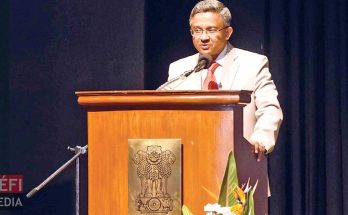 There is something touchingly beautiful about youth, with all its high hopes, impossible yearnings and the desire to make and remake your own world. Bliss was in that dawn to be alive, but to be young was very heaven, William Wordsworth wrote so eloquently and beautifully.
There is something touchingly beautiful about youth, with all its high hopes, impossible yearnings and the desire to make and remake your own world. Bliss was in that dawn to be alive, but to be young was very heaven, William Wordsworth wrote so eloquently and beautifully.
In many ways, this is a bright new dawn for our country when India is on the cusp of momentous changes and is re-scripting its own destiny. Our economy is reviving. India is being hailed by the World Bank and the IMF as the fastest growing large economy in the world. At the same time, India is also vigorously engaged in the process of rewriting the rules of global engagement.
India’s myriad civilizational strengths and its growing global profile make it indispensable to how a host of the world’s cross-cutting challenges ranging from terrorism and piracy to pandemics and climate change are tackled and resolved.
The world is looking at India with renewed respect and enthusiasm, and India is looking to proactively engage all corners of the world with added vigour. And this is where you young people, dynamos of energy, ingenuity and enterprise, come into the picture as the world becomes a truly global village, bringing diverse cultures and peoples together in a community of shared values and interests.
In India, the idea of a global village is ingrained in our collective consciousness and is embedded in our DNA. The Vedic ethos of vasudhaiva kutumbakam has animated our way of life down the ages; we in India have eagerly embraced the world and have always regarded the world as an extended joint family.
Down the ages, India has shown a rare receptivity and has been quick to absorb other cultures, religions and values, a relentless process of amalgamation and synthesis that has produced the rich tapestry of a pluralistic, multi-cultural and multi-religious syncretic India. In a seminal sense, India, in all its vibrant diversity and receptivity, is a microcosm of the world.
What it all adds up to is that there is really nothing foreign about our foreign policy in so far as foreign means something out there, which does not concern or impact our lives immediately.
We can’t pretend that what happens in far-off countries like Nigeria and Syria is of no concern to us; distance does not in itself provide for security. Terror groups active in distant lands now link with others across national boundaries.
Trade and investment have created an intricate global web of prosperity and interdependence; India, as you know, has become the back office of the world. When America sleeps, Indian techies provide back-end support. Oil you need to drive your cars comes from countries in the Middle East, Africa and Latin America, among other places. Indian spices tickle the palate in homes and restaurants around the world. And the sun never sets on the 25-million strong Indian diaspora.
Against the backdrop of this increasing interconnectedness of the world, India has forged a robust omnidirectional 360 degree foreign policy.
Today, I will limit myself to highlighting 4 key areas of focus of our foreign policy orientation.
First, we seek to harness our external engagements for national resurgence and development. Development and Diplomacy are inextricably intertwined in our foreign policy.
In fact, development is the over-arching imperative and focus driving our multifarious external engagements. Creating an empowered India with world-class infrastructure and higher standards of living for our 1.2 billion citizens is the core goal of our multi-pronged diplomatic endeavours.
Our foreign policy is, therefore, intimately tied to addressing developmental challenges and eliminating the curse of poverty and illiteracy. That’s why, if you have been following our recent diplomatic engagements, especially since the BJP-led NDA government came to power with a resounding majority in the May 2014 elections, seeking external partnerships in the area of infrastructure building and technology transfer has been a cross-cutting theme.
For example, Prime Minister Modi’s scheme of 100 smart cities has become normal diplomatic parlance in our engagements with India’s key strategic partners, including the US, Japan, Russia, China, Singapore and Australia, among others. The smart cities project should have a special resonance for the urban young who dream of world-class amenities and eco-friendly clean life right here in India. This is a pioneering project which illustrates the dovetailing of the domestic agenda and foreign policy.
Second, our ‘Neighbours First’ policy, also stems from a similar thought process. Promoting peace and stability in our immediate neighbourhood is underpinned by the premise that the destinies of over 1.5 billion people in South Asia are deeply and organically interlinked. Our neighbourhood policy is not just driven by security imperatives, but is animated by a narrative of opportunity and a vision of wide-ranging regional integration and connectivity.
It is this win-win vision which propelled Prime Minister Modi to invite the leaders of all SAARC countries at the swearing-ceremony of our Government in May 2014, a path-breaking diplomatic initiative that was meant to signal India’s thrust on putting neighbours first in its foreign policy world view. Again, it this soaring idea of a resurgent South Asia that was the basis of PM Modi making numerous announcements at the SAARC summit in Kathmandu that signal India’s desire to tie its destiny with that of its neighbours.
Third, we see Indian culture as our powerful asset in promoting India’s interests abroad. We do not flinch in emphasising on India’s value systems, its philosophy and spirituality for hope and renewal. The declaration of the International Yoga Day by the UN on June 21 underscores the global acceptance of this ancient practice of meditation and well-being. We are planning a host of events in the run-up to the celebrations of the International Yoga Day. The focus on culture is also evident in our outreach to the 25-million Indian diaspora spread across the world. Ensuring their welfare and protecting their interests remain our core foreign policy priority.
Fourth and last but not the least, I wish to underline that we are pursuing a people-centric, interactive and youthful foreign policy which is open to new ideas, new initiatives and new inspirations, specially from you young people sitting in this audience.
It is with young people in mind that we at the Ministry of External Affairs have launched a major social media outreach that not only showcases what we are doing with different countries and international organisations, but also elicit ideas from you.
And it is entirely up to you to drive this conversation and take it forward. In today’s wired world, foreign policy is not only about policy, but also about communication and projection. It’s not only what you say, but what you are seen to be saying that is equally important.
With more than 65 per cent of India’s population below 35 years of age, I see Indian youth as India’s foremost brand ambassadors and bridge-builders amid India’s expanding engagement with the world.
There is nothing like the heady intoxicating feel of youth, and I know it well. I still remember the excitement of becoming the youngest Cabinet Minister in Haryana at the age of 25!
Youthful energies need to be harnessed and leveraged in the right direction. And here, under this government, there is plenty to choose from in areas, where you can make a lot of difference. Dynasty is no longer destiny; talent is destiny. You can make your presence felt with your innovation and initiatives. With national development as the lynchpin of India’s foreign policy agenda, I urge you to be more proactive and drive the process of development and raising India’s global profile.
(This is the edited version of speech delivered by India’s External Affairs Minister Sushma Swaraj at International Youth Summit 2015 for NextGen World in New Delhi on February 20)
Author Profile
- India Writes Network (www.indiawrites.org) is an emerging think tank and a media-publishing company focused on international affairs & the India Story. Centre for Global India Insights is the research arm of India Writes Network. To subscribe to India and the World, write to editor@indiawrites.org. A venture of TGII Media Private Limited, a leading media, publishing and consultancy company, IWN has carved a niche for balanced and exhaustive reporting and analysis of international affairs. Eminent personalities, politicians, diplomats, authors, strategy gurus and news-makers have contributed to India Writes Network, as also “India and the World,” a magazine focused on global affairs.
Latest entries
 DiplomacyApril 10, 2024Diplomat-author Lakshmi Puri pitches for women power at LSR
DiplomacyApril 10, 2024Diplomat-author Lakshmi Puri pitches for women power at LSR India and the WorldApril 6, 2024UN envoy pitches to take India’s solutions to the world stage
India and the WorldApril 6, 2024UN envoy pitches to take India’s solutions to the world stage CultureApril 5, 2024Youth in Diplomacy: Making it Matter with LSR Model UN 2024
CultureApril 5, 2024Youth in Diplomacy: Making it Matter with LSR Model UN 2024 India and the WorldMarch 28, 2024India to China: Normalization of troops deployment imperative for restoring ties
India and the WorldMarch 28, 2024India to China: Normalization of troops deployment imperative for restoring ties







